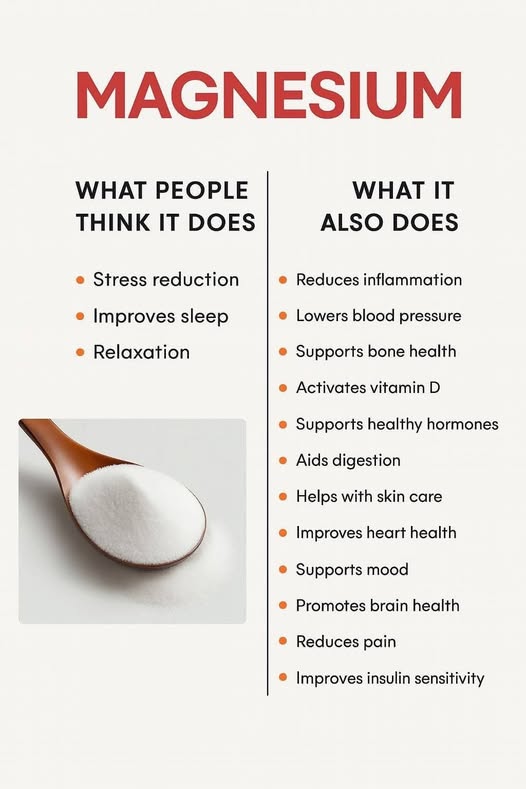Everything To Know About Magnesium In Your Diet
Magnesium is one of the most essential minerals your body needs — yet many people don’t get enough of it. Often overlooked compared to calcium or iron, magnesium plays a crucial role in over 300 biochemical reactions that keep your body functioning smoothly. From maintaining strong bones to supporting heart health, muscle performance, and restful sleep, this nutrient deserves a prime place in your daily diet.
Let’s explore everything you need to know about magnesium, including its benefits, the best food sources, and how to ensure you’re getting the right amount every day.
🧠 Magnesium in Your Diet: The Essentials
Magnesium is an essential macromineral — meaning your body requires it in relatively large amounts. Unlike trace minerals such as zinc or copper, magnesium is needed daily for a variety of bodily processes, including nerve signaling, muscle contraction, energy metabolism, and bone development.
Unfortunately, due to modern diets high in processed foods and low in whole, plant-based options, many adults fall short of the recommended magnesium intake. According to nutrition experts, an estimated 60–70% of people may be mildly deficient in this vital mineral.
🌟 Why Magnesium Matters
Here’s how magnesium helps keep your body healthy and balanced:
💓 Supports Heart Health and Blood Pressure Regulation
Magnesium helps maintain a steady heartbeat and assists in the relaxation of blood vessels, which can reduce high blood pressure. Studies show that adequate magnesium intake is linked to a lower risk of heart disease and stroke.
😴 Promotes Better Sleep
Magnesium helps regulate melatonin, the hormone that controls your sleep-wake cycle. It also activates the parasympathetic nervous system, which promotes relaxation and deep sleep.
💪 Aids Muscle Function and Prevents Cramps
Athletes and active individuals rely on magnesium for muscle contraction and recovery. Low magnesium levels can contribute to leg cramps, twitches, or muscle fatigue.
🧘 Reduces Stress and Anxiety
Magnesium has a calming effect on the nervous system by supporting the function of GABA receptors, which help manage anxiety and mood. It’s often referred to as the “relaxation mineral.”
🦴 Builds Strong Bones
About 60% of your body’s magnesium is stored in your bones. It works hand-in-hand with calcium and vitamin D to strengthen bone structure and prevent osteoporosis.
⚡ Boosts Energy Production
Magnesium is essential for creating ATP (adenosine triphosphate) — your body’s main energy molecule. Without enough magnesium, your cells can’t efficiently convert food into usable energy.
🍬 Balances Blood Sugar Levels
Magnesium helps regulate insulin activity and improves glucose metabolism, reducing the risk of insulin resistance and type 2 diabetes.
🥗 Top Magnesium-Rich Foods
You don’t necessarily need supplements to meet your magnesium needs — most people can get enough from a balanced, whole-food diet. Here’s a quick guide to some of the best sources of magnesium:
| Food Group | Examples & Magnesium Content |
|---|---|
| Leafy Greens | Spinach (150 mg per cup, cooked), Swiss chard, Kale |
| Nuts & Seeds | Pumpkin seeds (150–170 mg/oz), Almonds, Cashews, Sunflower seeds |
| Legumes | Black beans (120 mg/cup), Lentils, Chickpeas, Kidney beans |
| Whole Grains | Quinoa (118 mg/cup), Brown rice, Oats, Buckwheat |
| Fatty Fish | Mackerel, Salmon, Halibut (80–90 mg/serving) |
| Dark Chocolate | 65 mg/oz (70–85% cocoa), a delicious magnesium boost |
| Avocados | About 60 mg per medium avocado |
| Bananas | 32 mg per medium banana — a great on-the-go option |
| Tofu | 80 mg per ½ cup — perfect for plant-based diets |
⚖️ Recommended Daily Intake
The Recommended Dietary Allowance (RDA) for magnesium varies depending on age, sex, and life stage:
| Group | RDA (mg/day) |
|---|---|
| Adult men (19–30 yrs) | 400 mg |
| Adult men (31+ yrs) | 420 mg |
| Adult women (19–30 yrs) | 310 mg |
| Adult women (31+ yrs) | 320 mg |
| Pregnant women | 350–400 mg |
| Breastfeeding women | 310–360 mg |
Most people can meet these needs through diet, but those with high stress levels, intense exercise routines, or digestive issues may need more magnesium than average.
🧃 Signs of Magnesium Deficiency
Magnesium deficiency (hypomagnesemia) often goes unnoticed but can lead to various symptoms, including:
- Muscle cramps or twitches
- Fatigue or weakness
- Mood changes, irritability, or anxiety
- Irregular heartbeat
- Sleep disturbances or insomnia
- Headaches or migraines
If these symptoms persist, consult your healthcare provider — a simple blood test can check your magnesium levels.
💊 Should You Take a Magnesium Supplement?
While a balanced diet should supply enough magnesium, supplements can help if you have increased needs or absorption issues.
Some common and effective forms include:
- Magnesium glycinate: Gentle on the stomach and helps with sleep and relaxation.
- Magnesium citrate: Aids digestion and supports regular bowel movements.
- Magnesium malate: Boosts energy and reduces muscle fatigue.
Avoid taking too much at once — excessive magnesium from supplements (not food) can cause diarrhea or stomach discomfort.
🥣 Tips to Boost Magnesium Absorption
- Limit caffeine and alcohol, which can deplete magnesium levels.
- Pair magnesium-rich foods with vitamin D and healthy fats for better absorption.
- Choose whole, unprocessed foods over refined grains.
- Stay hydrated — dehydration affects mineral balance.
- Manage stress, as chronic stress can increase magnesium loss.
🌿 Final Thoughts
Magnesium may not always make the headlines, but it’s a powerhouse mineral your body depends on every day. Whether it’s keeping your heart steady, your muscles relaxed, or your sleep deep and peaceful, magnesium works behind the scenes to keep everything running smoothly.
By filling your plate with leafy greens, nuts, seeds, whole grains, and dark chocolate, you’ll not only meet your magnesium needs but also support overall wellness and vitality.
So next time you plan your meals, remember — a little magnesium goes a long way toward a healthier, calmer, and more energized you.
